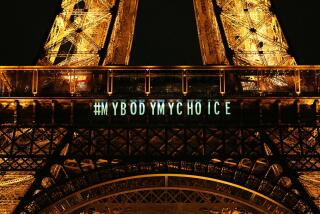4 Libyans Expelled by France : Paris Smarting for Barring U.S. Warplane Flyover
- Share via
PARIS — The French government, in the face of barbed criticism both here and in the United States for refusing to let U.S. warplanes fly over France on their way to bomb Libya, announced Friday that it was expelling four Libyans for “actions likely to trouble public order.”
“We are terrorizing the terrorists,” the deputy minister for public security, Robert Pandraud, said in a radio interview.
But Pandraud refused to elaborate on the government announcement, which neither identified the Libyans nor detailed what they had done.
“No details will be given from official sources on the carrying out of this expulsion,” said the announcement issued by Pandraud’s office.
The Libyan’s People Bureau, as Libya calls its embassy, insisted that it had no idea who the four were.
Ordinary Passports
The four took off for Tripoli after waiting nearly four hours under police custody at Orly Airport. Police sources refused to identify them but said that their passports, which were not diplomatic, showed they had been living in France for less than three months.
The French government’s announcement came after several days in which the government of Premier Jacques Chirac faced attacks from members of his own ruling conservative coalition, including former President Valery Giscard d’Estaing, for refusing the American request that F-111 fighter-bombers be allowed to fly directly from Britain to Libya over France. The French refusal, coupled with a similar stance by Spain, forced the American bombers to take a long detour down the Atlantic west of Europe and then across the Mediterranean.
For several days, French newspapers have reported a groundswell of anger in the United States against France, reflected in angry phone calls to French consulates throughout the United States and boycotts of French specialty stores.
Praise Overwhelmed
This, according to the French news reports, has overwhelmed the praise given France by President Reagan for expelling two Libyan diplomats and two other Middle Easterners earlier this month and thus preventing a terrorist attack on the U.S. Consulate building in Paris.
The controversy has created the most significant domestic political problem for Chirac since he took over as premier after the conservative victory in last month’s parliamentary elections. For the first time, he has been sharply criticized in public by members of his own coalition.
They suspect that Chirac succumbed either to his political need for close relations with Socialist President President Francois Mitterrand or to the independent, anti-American foreign policy tradition of the late President Charles de Gaulle. Chirac’s party, the Rally for the Republic, regards itself as Gaullist.
In a statement issued earlier this week, Giscard d’Estaing, who heads the Union for the French Democracy, the junior partner in Chirac’s coalition, took a position directly opposed to that of the premier.
Solidarity Urged
“I approve of the American action in Libya, justified by repeated acts of aggression against the people of the Western democratic countries,” Giscard d’Estaing said. “In periods of tension provoked by acts of international terrorism, the West must show all the evidence of its solidarity.”
The decision to refuse the American request to fly over France was made by both Chirac and Mitterrand. For the first time since its constitution was written in 1958, France has a president and premier of opposing political parties, a situation that has created an odd, hybrid executive. Under the constitution, Chirac runs the government day in and day out, including the ministries of foreign affairs and defense, but Mitterrand still has special responsibilities in the fields of foreign affairs and defense.
In its brief tryout period, the novel system, which the French call “cohabitation,” has caught the fancy of the public, and the popularity ratings of both Mitterrand and Chirac have soared. Neither wants to be seen by the public as guilty of smashing down cohabitation.
Deference Suspected
Some followers of Giscard d’Estaing, who have been irritated in any case at the way Chirac has tended to dominate them in the first few weeks of government, suspect him of deferring to Mitterrand on the decision about the American bombers.
In a press briefing, however, Denis Baudouin, Chirac’s spokesman, gave several other reasons for the French refusal. He said that France took into account its hostages held in Lebanon and its feeling that the bombing raids would be counterproductive. He added that the refusal did not hurt the American operation in any way.
More to Read
Sign up for Essential California
The most important California stories and recommendations in your inbox every morning.
You may occasionally receive promotional content from the Los Angeles Times.












